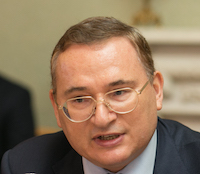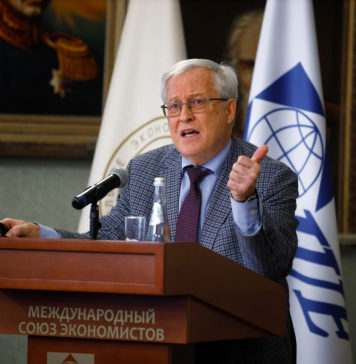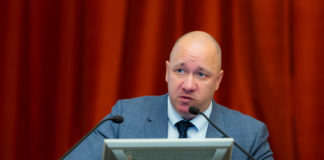The presentation of Abel Aganbegyan’s new book caused a heated discussion on the role of finance in the development of the country’s economy.
Risks and opportunities for financial capital
 Sergey Bodrunov
Sergey Bodrunov
President of the VEO of Russia, President of the International Union of Economists, Director of the S.Yu. Witte Institute of New Industrial Development, RAS Expert, Doctor of Economics, Professor
Today, we considered it very important to discuss (and the relevance of this topic is important, and there is a good reason for discussing it) financial capital, finance, budget and banks in the new Russia. Why is this topic important to us today? Because financial capital has a peculiar feature in Russia (we’ll talk about that in a moment), and most importantly, we have an excellent reason: a new book, Finance, Budgets and Banks in the New Russia, by Abel Gezevich Aganbegyan whom I am happy to welcome.
Abel Gezevich is an outstanding economist, the author and co-author of more than 250 scientific papers; his books on economic issues have been published in 12 countries. We know him as a person who not only devoted his whole life to studying the social and economic development of Russia, but also did a lot of practical work towards achieving this goal.
As I recall, the Presidential May Decree clearly formulated the task of restoring the country’s economic growth; by 2024, we need to halve poverty, increase life expectancy, ensure natural population growth, and become one of the five largest economies in the world. This is not an easy task, it is a complex and worthy challenge. The main problem is not only to overcome the crisis in the domestic economy, but also to eliminate the technological lag of Russia from the developed countries.
Why is Academician Aganbegyan’s book important in this context? Since its inception, the financial capital played a certain auxiliary role, supporting the development of production, the needs of society for product, goods, and services. However, nowadays it has become overblown and has started to play a decisive role in the development of the world economy, it holds sway over the real sector of economy.
In his book, Abel Gezevich provides specific numbers. For example, in Western Europe, banks’ assets have exceeded the GDP by 2-3 times, the US stock market and national debt are also significantly larger than the GDP; each of the volumes of insurance, mortgage, mutual funds and assets of investment companies has approached the GDP volume; the volume of derivatives is 12 times greater than the global GDP. Priorities have changed in the endless chain of capital movements, a shift has occurred in the economic worldview: money is no longer considered an intermediary between goods, but vice versa. As a consequence, capital has ceased to be closely related to the real sector of the economy, as the author rightly notes.
In order for the system to work, simulative needs are imposed on people, and productive capital is being pushed out by financial capital. This really changes the structure of the real sector, and the image of society. Those changes are far from being always positive. Further development of this process is fraught with at least a slowdown in the development of economy, a deepening crisis, etc. That’s why we must now find ways to influence financial capital, push it in the right direction, use it for the benefit of economy, not for its destruction.
Colleagues, what I mean is this. Profit has always been the main function of capital. That’s why it’s mainly used to search for new areas of application and new markets. However, here lies a certain duality of financial capital. On the one hand, in its search for new applications, it stimulates innovative processes by being forced (emphasis is mine) to create new products and services. On the other hand, staying largely in the speculative field, which is more flexible and efficient in terms of profit in the current economic paradigm, it siphons off funds from the real sector, hampering technological development. By its nature, it contributes to the development of the production of simulative goods and is prone to clearing markets by any means necessary, including the use of force, particularly military force.
The world is well aware of that. The US is now concerned with reshoring of high-tech manufacturing and technological innovation. Just a few days ago, the United States signed a new agreement with Canada and Mexico, which President Trump assessed in the following manner: «It is a great deal, it returns to the country the status of the world’s industrial giant». He pays close attention to this fact. Investments in new industry are actively supported in Germany and China. The implementation of Deng Xiaoping’s idea, expressed as early as 1984, has been going on for more than 20 years (emphasis is mine). The idea is as follows: China must relinquish part of its market in exchange for advanced technologies. A realization is coming (and has, in fact, already come) that today’s technological leaders will be the economic leaders of the future. To this end, investments in technological and innovative development are encouraged in advanced economies.
The world has invented and tested various instruments for the involvement of capital in the investment process. One of those powerful mechanisms is reviewed in the book written by Abel Gezevich. We are talking about the financial boost policy (Abel Gezevich mentions that the term was coined by Yakov Moiseevich Mirkin). At times, as Abel Gezevich points out, financial boost played an important role in the development of a number of countries, especially Japan, China and South Korea. The author notes that within 10 years on average these countries managed to increase their GDPs by 1.6-2 times. And if Russia also resorts to the financial boost policy, it will be able, in the opinion of the author, to reach the level of developed countries in 15-20 years in terms of economic and social indicators, and the level of the most developed countries in another 10 years.
In my opinion, it is impossible to argue with such a direction of thought. The esteemed academician, of course, has provided an extremely valuable recommendation in this regard. We need, and I emphasize, we need a kind of financial boost. Frankly, I’m glad to hear it from the respected author, because for many years I’ve been thinking along the same lines, of which you, dear colleagues, are well aware.
However, I must point out an extremely important problem. The current situation in Russia is such that in addition to public investment we need private investment, and private owners are not particularly active in spite of the Government’s appeals. I will probably not discover America by saying why: the level of distrust in the private sector is very high (as is also noted by the author), and there must be a significant government effort to improve the confidence in the government and in economic stability on the part of business community. This is my first point.
The second point. Financial boost does not mean throwing money around. It means targeted investments in breakthrough areas of fifth-generation technologies, which form the so-called new economy of the next technological mode, creating products based on info-, cogni-, nano-, bio-, geno- and other technologies. I fully support the point Abel Gezevich made on page 311 (please allow me to quote it): “Through the Central Bank and Vnesheconombank, reliable commercial banks should be supplied with large amounts of funds in foreign currency for the provision of investment loans for technical upgrades of existing production; for the establishment of new industries and businesses with an emphasis on the production of finished products with high added value, primarily, high-tech investment goods and services; for the establishment of infrastructure…” Dear colleagues, this is important, it’s a factor, without which we can no longer count on the effective development of our economy. And, of course, the third important point. We must prevent the financial boost funds from being siphoned off. It is necessary to take institutional measures to control capital, limit criminal exports, tighten control over financial assets, and limit the absolute power of financial capital. We will get a positive result only if we act in those three areas being fully aware of their complex interrelation.
You should not consider my call for limiting financial capital as its repudiation at this stage of historical development. Financial capital has a dual nature, today it is not only a sponsor of creating fictitious goods and simulative needs, it is also an accelerator of the development of real production, including to some extent the process of innovation; it is necessary to use its positive feature I’ve just described, it is necessary to transform financial capital by turning it into an accelerator of the innovative development of the real sector. Only then can we avoid a lot of problems in the future, such as the final “victory” of financial capital and the subsequent “clearing” of markets.
Backwardness of the financial system
 Abel Aganbegyan
Abel Aganbegyan
Head of the Department of Economic Theory and Policy at the Russian Presidential Academy of National Economy and Public Administration (RANEPA), Academician of the Russian Academy of Sciences
I tried to write this book in order to discuss issues of the financial system, many of which, unfortunately, have not even been discussed. We do not discuss the question of why we have failed to increase the gross domestic product over the 27 years of the new Russia. And if we disregard the tenfold increase in oil prices and look at how we have evolved by our own factors, we will see a 20% drop in the volume of social production. Do you understand? It just does not happen: not a budge in 27 years. Why? Because we have not created a mechanism that would push us forward. And without such a mechanism, how can we develop? Those fundamental issues are not even discussed; they are implied, everyone knows about them, they are not so much as a secret but…
Our socio-economic sphere has two areas which are the most lagging by global reckoning. The most lagging area is healthcare. The main indicator of the quality of public health: we are in 119th place according to the World Health Organization. And it’s a very broad indicator, which consists of 90 elements divided into 12 groups: in general, it’s not that we just sat down and began to vote; it is a painstaking work, involving Russian and foreign experts, being compared to other countries in many respects.
By life expectancy, we are closer to one hundredth place. Life expectancy is an extremely important indicator. The duration of healthy life is even worse, we do not calculate it at all. Putin was the first who mentioned this indicator in the Government’s official documentation, initially in his Message to the Federal Assembly; he even set a task: it should reach the age of 67 by 2024. It is not known how to calculate it: Russia has no methodology, neither the Ministry of Health nor Rossstat can calculate it, it’s a completely new indicator to us. The entire world has been calculating it, but the World Health Organization has been doing it for Russia. That is, our healthcare system is terribly backward. By healthcare financing (since we are talking about financing) we are in 147th place out of 193, we spend 4.1% of the gross domestic product on healthcare according to the UN official statistics, a fairly well-known rating.
And, oddly enough, the second most lagging area is finance. There are almost no finance indicators, whereby we are above one hundredth place. For example, we are 107th by the “development of finance” indicator, 105th or something like that by “monetization of the economy”. The share of banks’ assets in the gross domestic product, the share of credit, interest rate, inflation rate… These indicators can be broken down into various sub-indicators and none of them are good enough. For example, the share of mortgage in the GDP is 5%, and so on.
But no one wonders how much longer we can tolerate such a backward financial system? The role of finance is unclear. And even when we discuss reforms in great detail we do not ponder the most important issues. For example, the pension reform: what are we discussing? The timeframe. But we do not discuss pension financing. No one discusses the question of whether the country can at all pay pensions without the participation of the people. Nothing is being deducted from the people’s income, and at the same time we keep 50 million pensioners afloat; can we do this? By what means? On account of the 13% income tax? Or can we pay pensions from another source? We can do it only if pensions are meager; compared to the other countries of the world we are in 98th place by the standard of living of the pensioners, and in 50th place by per capita income of the workers; we cannot pay normal pensions. And, secondly, we pay pensions on account of huge taxes on businesses. When you overtax businesses, you are cutting the branch you’re sitting on: how can a business develop if you take so much money away from it in the form of compulsory social security contributions? When a business is overtaxed, it runs on credit, but look at those interest rates! And so on. Those issues are not discussed. There’s not a single country that can pay pensions without contributions from the people. I’m not talking about Monaco, which pays for a lot of things from casino revenues, but no normal country can exist in a free market environment without people’s contributions. Do you understand?
Take the healthcare system. Is it possible to pay health insurance without the participation of the people? There are two countries with government-sponsored health care systems: Canada and England, but they have the world’s highest income taxes; with such taxes (40% is deducted from more or less decent salaries), if you deduct 40% from people’s incomes, you can, of course, allocate a significant portion to health care. But in every other country the population pays half or more of the costs of obligatory insurance.
And that is why I wanted to discuss the book: firstly, to discuss other questions raised in it (perhaps in a more delicate manner). After all, I’m not a financier, I have no special education or work experience in that area. I was chairman of the Council of Banks for six years, but it is not operative work, in a sense it is still a macroeconomic, a strategic work, so I have no firsthand experience, I have never worked at a stock exchange and have a poor overall understanding of how it functions. There’s a lot of things I know little about. When I attempt to learn something from my son (I always ask him, he used to manage a stock exchange), he laughs at me and says: “You won’t understand anyway. It’s quite difficult for you to understand.”
So I cannot consider myself a specialist, and I just wanted to discuss it among specialists who are in perfect position to criticize the weak arguments. I want to continue my work, I want to eventually release a second edition, I recommend those works to those who attend my lectures on various topics.
I don’t want you to evaluate the book, I want you to discuss it. Therefore, I really lay my hopes on your comments and fresh ideas. Perhaps you will suggest some substantial issue that’s missing from the book. It’s not your approval that I need (please refrain from words of praise). I need a critical discussion on the merits.
I borrowed the term «boost» from a book on Asian “tigers” (it has a different title) edited by Yakov Moiseevich Mirkin. It has a lot Russia and it includes a paragraph on how everything in it is tied in to Russia. Let me remind you that the famous naturalist Cuvier, who had created paleontology, the science that tells us how to distinguish between a dinosaur and a mammoth by a single bone, while on his deathbed, made a very important point, which I really like, «If I had a single thought of my own in all my life, then I am a genius.»
What is financial boost?
 Yakov Mirkin
Yakov Mirkin
Head of the Department of International Capital Markets at the National Research Institute of World Economy and International Relations, Doctor of Economics, Professor
Abel Gezevich, a major flaw is the idea that those topics have never been discussed. As for the discussions to the effect that Russia’s financial sector and financial system are too shallow and inadequate to the size of the Russian economy, and that their inadequacy is artificial and stems from the policy, which has been pursued for a quarter century, I have personally been involved in such discussions in one way of another since the late 1990’s, including books and publications.
First. A very important point has been ignored: in addition to economic development there is financial development. Attempts to discuss the need for wider monetization, more debt and credit assets, normalization of interest rates (which is actually possible), what kind of financial market we need and how to build it, those attempts always ran into the mainstream in ideology and practical politics.
As a result, by the time we were told that after all we should grow at a rate above the world’s average this year (i.e. about 4%) we had a very shallow financial system, because, for example, while Russia’s share in the global GDP was 2.8% in 2014, and now it is 1.9%, its share in global financial assets never exceeded 1%, and now it’s 0.4-0.5%.
The second point, which will also be probably ignored, concerns financial boost. By the time we were supposed to switch to a superfast growth (I wish we did) we are not only stuck with a shallow financial system, we also are not going to configure it in such a way that it could stimulate superfast growth. Although, by pure analogy, the body of a person who slowly walks is adapted to slow movement; if a person starts to run, every system in the body should be given a boost.
Therefore, we need to be solving two problems at the same time. On the one hand, normalization of the financial sector, interest rates, volumes, monetization, suppression of inflation, normalization of the exchange rate, and plain stabilization, because this small boat is always rocking from side to side. On the other hand, there is also stimulation.
As a result, in terms of finance, we have a very strange economy. Today, by having suppressed our own financial sector and by continuing to do it, we made the economy even more budget-dependent. In order to grow, every industry must rely on the budget (reimbursement of funding from the budget, interest rates which are normalized through money from the budget – every little problem is being solved either through tax benefits or budget preferences). If you think about it, the economy is supposed to use the budget to solve issues related to superfast growth, the social and military spheres and to create reserves at the same time. In terms of its financial core, such an economy is simply unable to ensure superfast growth, it can’t be done through the budget.
On the one hand, the policy of financial boost is a policy of normalization of monetary base, financial assets, interest rates, implying suppression of inflation, low and stimulating exchange rate, reduction of the tax burden and very strong tax incentives for growth, with simultaneous solution of other tasks, because if we limit ourselves to the task of financial boost, we can immediately expect problems with capital account, cash flight, conversion of cash into hard currency and so on. Of course, the policy of financial boost is a policy of configuring the financial system to promote and stimulate growth. It must be tied in to the economic and industrial policy, the administration of development, by way of reducing the administrative burden, which is growing exponentially, and dozens of other pieces of the macroeconomic mosaic; a policy especially designed to stimulate growth.
Life-giving soil instead of asphalt is the expression I would use: it immediately widens investment horizons and is aimed at supporting everything that wants to grow; it largely solves the capital flight problem (because who wouldn’t want to work at home) and the problem of direct foreign investment, because with the growth rate of 4-5 %, when the economy begins to accelerate despite the sanctions, many of the problems go away. I have been doing this for 20 years, starting from the imperfections of the financial market, their descriptions and how to cope with them, then switched to the flaws in the financial system, and wrote a big book called Russia’s Financial Systems in 2011, describing the risks, extremes and so on. I still subscribe to all of the predictions. There were a lot of books devoted to Asian miracles and the like, but there were no books examining in detail the financial mechanism of such miracles. We described such a mechanism in a book published in 2014, and analyzed the situation in Japan, South Korea, China, Malaysia and Singapore, the countries that certainly had their own peculiarities, but we were told that Russians were no Asians. At the end of this year we are releasing a book describing economic miracles from a financial point of view, plus we added a very important subject – the administration of development. The book describes what happened in post-war Europe from a financial point of view. We studied Germany, Italy, Spain, and even added Israel as a country with European culture. We tried to show that, despite the difference in traditions and national character and in the levels of economic maturity, all of those countries followed approximately the same path, using different instruments with varying degree of adjustment strength – it is clear that Asia required a much stronger adjustment.
It was the so-called state-supported development, Central Bank development, Ministry of Finance development, it was quite an extensive intervention of the state in the financial system; it had to be readjusted (to stimulate growth), normalized, and then set free upon reaching a certain degree of maturity; it had to be liberalized and cast afloat. There are hundreds of tools for it. A macroeconomic, macrofinancial engineer will always figure out how to cure a system from a financial point of view, it’s not a problem at all. Even today, most of the tools already exist, even within the system under which we worked. Then it’s important not to ideologize “financial boost”, or “economic boost”, or “economic development”, or “new mainstream”, a matter which should probably be discussed separately; it concerns models of behavior: behavior patterns of the elite, the top leadership, their goals, characters, desires, etc. And, of course, a model of mass behavior, because all sociological forecasts suggest that 70-80% of the Russian population is in love with the state, and we need a very serious progress with regard to the behavior model, although the practice of economic miracles has shown that it is possible.
In conclusion, I would say that the mosaic of macroeconomic policies that drive financial boost is a policy of stimulation and administration which has a specific purpose. It represents a tremendous change in the behavior patterns of basic actors who may or may not create an economic miracle in Russia.






































